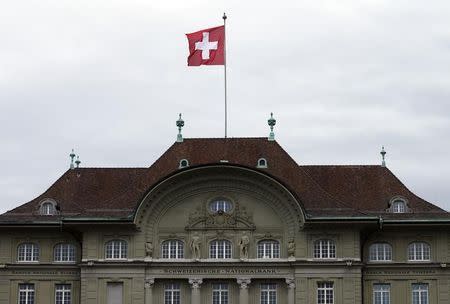Strong franc leaves 30 billion Swiss franc hole in SNB balance sheet
ZURICH (Reuters) - The Swiss central bank posted its biggest quarterly loss on record on Thursday, after the appreciation of the franc against the euro inflicted hefty losses on its holdings of the single currency.
The Swiss National Bank (SNB) stunned financial markets on Jan. 15 when it abandoned its cap on the value of the franc versus the euro, a policy it said would have cost roughly 100 billion Swiss francs (£69 billion) to defend that month alone.
The SNB chalked up a first-quarter loss of 30 billion Swiss francs, as income earned from a charge on franc deposits held by financial institutions at the central bank failed to offset losses on both foreign exchange and gold holdings. It reported a profit of 4.4 billion francs in the same quarter last year.
Had the SNB maintained the cap on the franc in the face of a quantitative easing programme by the European Central Bank, the expansion of the SNB's balance sheet would have been even greater and eventual losses more devastating, said Peter Rosenstreich, head of market strategy at Swissquote Bank.
However, the loss could have political repercussions for the central bank, and could rule out an annual payment to its shareholders, including the federal government and cantons.
"This massive loss will have a lasting sting on the psyche at the SNB and politically within the cantons, which might hamper policy strategy moving forward," Rosenstreich said.
A rise in weekly sight deposits as well as a fall in the franc have suggested the central bank is still intervening to weaken the currency, something the SNB said it remains prepared to do.
The appreciation of the franc resulted in a 29.3 billion franc loss on foreign currency positions, with exchange rate-related losses on all investment currencies amounting to 41.1 billion francs.
The SNB said euro-denominated assets made up 42 percent of its portfolio at the end of March, down from 46 percent at the end of December, while 32 percent was held in dollars, up from 29 percent at the end of 2014.
The removal of the cap has crimped the competitiveness of Swiss firms, which have cut prices in order to maintain their business activities, the KOF Swiss Economic Institute said on Thursday. Its leading economic barometer fell to 89.5 points in April from a revised 90.9 points in March.
(Reporting by Alice Baghdjian and Joshua Franklin; Editing by Crispian Balmer)



